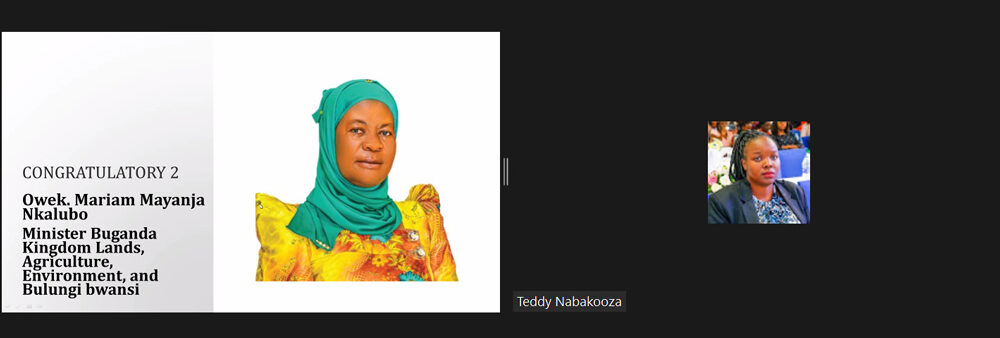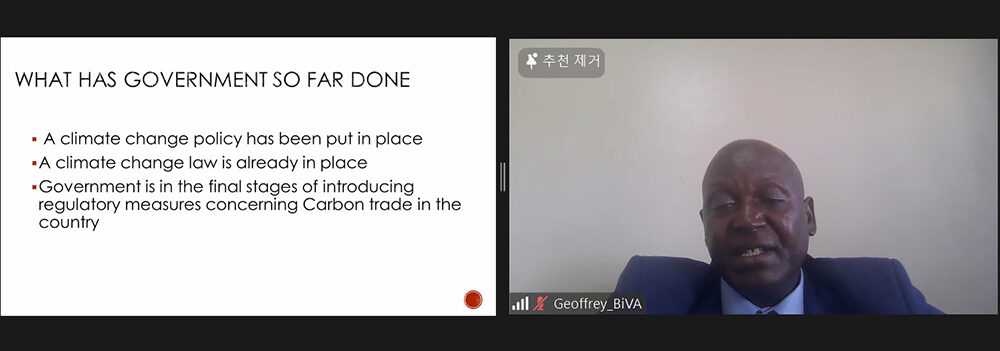Understanding the Impact of Water on Peace and Security in Uganda: Exploring Challenges and Solutions
On April 19th, HWPL’s global 12 branches held an environmental webinar titled “Understanding the Impact of Water on Peace and Security in Uganda: Exploring Challenges and Solutions”, aiming to promote global peace and prosperity through water management and cooperation.

▲ HWPL & Bio Vision Africa MOU Signing Ceremony
The event was attended by around 50 participants from various sectors in Africa, including representatives from the Buganda Kingdom’s Ministry of Community, Environment, Water, and Gender (acting on behalf of the Minister), Uganda’s Ministry of Science, Technology, and Innovation, the Khmer Youth Association, and teachers from Kenya. Additionally, an online MOU signing ceremony between Biovision Africa, which continuously monitors environmental and water resource management in Ugandan communities, and HWPL, which engages in various international peace activities, was conducted.
Many countries, including Uganda, face significant challenges in water quality and soil management due to rapid urbanization, deforestation, population issues, and other environmental problems. Rural areas, in particular, struggle with water scarcity and the management of purification facilities and technologies, posing potential risks for conflicts with neighboring regions.
In this context, HWPL’s 12 Global Branch organized the webinar to share the realities of climate change and environmental issues, and to discuss solutions with citizens from Uganda, Kenya, and Cambodia.

▲ Congratulatory Speech by the Deputy Minister of the Buganda Kingdom
The first part of the event included a congratulatory address from various dignitaries and the MOU signing ceremony between HWPL and Biovision Africa, which pledged to create practical and sustainable activities for local communities.
The second part began with a presentation by Monirath Prak, President of the Khmer Youth Association, a Cambodian NGO. He emphasized, “To address climate change, youth-led projects must be activated and supported to bring about positive changes.”
Patrick Katagata, an officer at the Science, Technology and Innovation Secretariat under the President’s Office in Uganda, stated, “Water is a significant issue both nationally and globally. It can become a problem for all of us, and we can solve it. Raising awareness and preserving watersheds to ensure proper utilization and protection of water should be a top priority to prevent environmental pollution and destruction and their adverse impacts on socio-economic and political stability. Strengthening cooperation with cultural and religious institutions locally and globally will be helpful.” He presented on ‘The Impact of Water Stress on Peace and Security in Uganda.’
Thomas Kim, team leader of International Law at 12 Global Branch, discussed ‘War and Climate Change,’ saying, “As stated in Article 2 of the Declaration of Peace and Cessation of War (DPCW), gradually reducing war and weapon production will decrease greenhouse gas emissions. These changes will provide more benefits to humanity, including a clean environment and good climate.”

▲ Presentation by the Executive Director of Biovision Africa
Finally, Geoffrey Kamese, Executive Director of Biovision Africa, highlighted ‘Challenges for Climate Change, Peace, and Security in Uganda,’ stating, “We must build the capacity of communities to respond to numerous climate challenges without causing conflicts. Efforts should be made to establish a national climate change fund, lobby for climate finance, demand climate justice, and gradually phase out fossil fuels while striving for 100% renewable energy.”
Teddy Navakuza, Deputy Minister of the Buganda Kingdom’s Ministry of Community Self Help, Environment, Water, and Gender, expressed, “I was impressed by the overall content of the webinar. I hope the practical activities proceed well in the future. I also congratulate the MOU signing between HWPL and Biovision Africa and look forward to cooperating with the Buganda Kingdom.”













